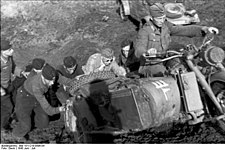Johann Mickl, Date of Birth, Place of Birth, Date of Death
TweetJohann Mickl
German general and Knight's Cross recipientAbout Johann Mickl
- Johann Mickl (18 April 1893 – 10 April 1945) was an Austrian-born Generalleutnant and division commander in the German Army during World War II, and was one of only 882 recipients of the Knight's Cross of the Iron Cross with Oak Leaves.
- He was commissioned shortly before the outbreak of World War I, and served with Austro-Hungarian forces on the Eastern and Italian Fronts as company commander in the Imperial-Royal Mountain Troops.
- During World War I he was decorated several times for bravery and leadership, and was wounded on four occasions, finishing the war as an Oberleutnant. Immediately after the war, Mikl served in the Volkswehr militia which was formed to resist the incorporation of his home town of Radkersburg into the newly created Kingdom of Serbs, Croats and Slovenes.
- He served with the Austrian Army from 1920 until the Anchluss in 1938, when it was absorbed by the Wehrmacht, and he transferred to the German Army as an Oberstleutnant.
- He commanded an anti-tank battalion during the invasion of Poland and Battle of France, during which he was awarded the Iron Cross 2nd and 1st Class, and was promoted to Oberst.
- Through the intervention of a friend, the adjutant of Generalleutnant Erwin Rommel, under whose command he had served in France, Mickl was transferred to North Africa to command a rifle regiment.
- He was awarded the Knight's Cross of the Iron Cross for his leadership of a kampfgruppe during the Battle of Sidi Rezegh, during which he and 800 of his soldiers were captured by New Zealand troops.
- Two days later he precipitated a successful mass escape from a prisoner of war collection point. He briefly commanded the 90th Light Division Afrika in late 1941 before being wounded.
- After he recovered he was sent to the Eastern Front.
- Mickl commanded the 12th Rifle Brigade of the 12th Panzer Division in the east, taking over the 25th Panzergrenadier Regiment when his brigade headquarters was disestablished.
- Transferred to the Führerreserve, he was promoted to Generalmajor, and received the Oak Leaves to his Knight's Cross of the Iron Cross for his outstanding commitment and leadership during the Soviet 1942–1943 winter offensives around Rzhev.
- He then commanded the 11th Panzer Division during the Battle of Kursk.
- Later in 1943, he was appointed to train and command the 392nd (Croatian) Infantry Division, and led it in fighting against the Yugoslav Partisans before dying of wounds inflicted in the last month of the war.
- In 1967, the Austrian Bundesheer barracks in Bad Radkersburg was named after him.
Read more at Wikipedia


 Date of Birth:
Date of Birth:  Place of Birth: Radkersburg Umgebung, Styria, Austria
Place of Birth: Radkersburg Umgebung, Styria, Austria
